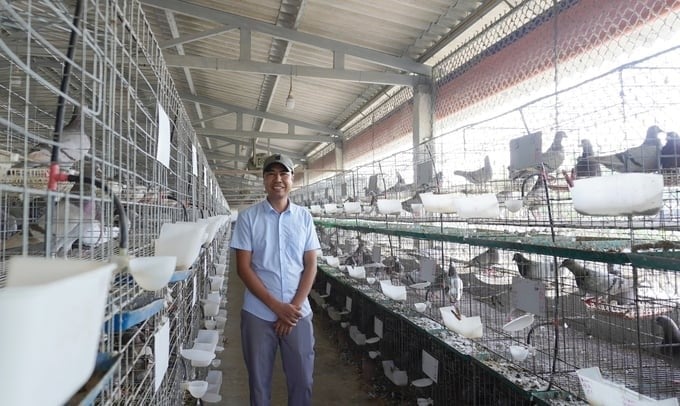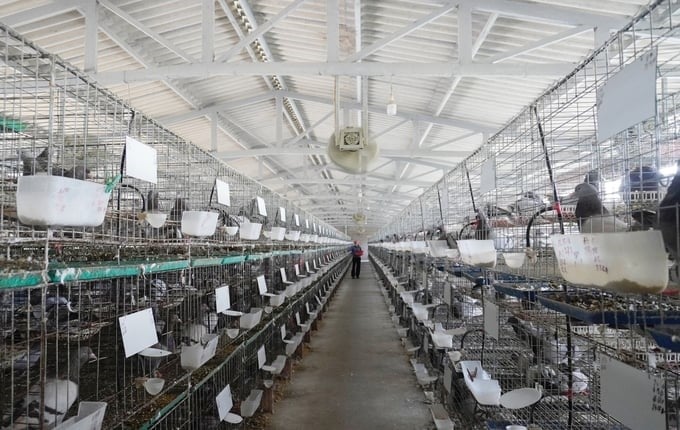June 15, 2025 | 03:25 GMT +7
June 15, 2025 | 03:25 GMT +7
Hotline: 0913.378.918
June 15, 2025 | 03:25 GMT +7
Hotline: 0913.378.918

Mr. Nguyen Ngoc Thanh (1983) in Dong Phong village, Binh Lang commune (Tu Ky, Hai Duong) said that the process of herbal French pigeon farming in an organic direction is very strict and elaborate. Photo: Hong Tham.
The herbal French pigeon farm in the organic direction of Mr. Nguyen Ngoc Thanh in Dong Phong village, Binh Lang commune, has a clean, airy, and particularly odor-free farming space.
In models of raising pigeons for meat, the French pigeon is the most chosen because this is the most famous meat breed. Each year, one pair can lay 8–9 litters, weighing birds (28 days old) at 530–580 g/head. This bird is highly adaptable to climatic conditions in Vietnam, with a survival rate of 94–99%.
Due to the demand for the family's economic development, from accumulated capital combined with loans from banks and relatives, in 2015, Mr. Thanh invested in building a farm to raise French pigeons with herbs in an organic direction, with an expense of VND 1 billion. Currently, his farm is raising 2,600 pairs of parent pigeons, providing 3,800–4,200 commercial birds to the market each month.
Mr. Thanh said that "French pigeons are easy to raise, less susceptible to diseases, and have a large weight, so they bring high economic efficiency. However, the process of herbal French pigeon farming in an organic direction is very strict and elaborate, from food and drinking water sources to aviary temperature".
Mr. Thanh's aviary area for raising French pigeons with herbs is designed on a large scale and scientifically. The aviary is airy, has a feeding trough, a drinking trough, enough light, a roof, and is regularly cleaned.
To ensure a suitable temperature for the barn, Mr. Thanh does not use air conditioners in closed barns, like raising some types of short-term poultry, but arranges sensors to automatically operate water loads onto the barn roof for cooling when needed. The barn door is designed to take advantage of natural air, creating conditions for livestock to adapt well to the environment.

Mr. Thanh's barn for raising French pigeons with herbs is designed on a large scale and scientifically, and the most impressive thing is that there is no odor. Photo: Hong Tham.
Mr. Thanh also pays attention to drinking water sources for birds. Water is led from the pond into a tank with biological products and aquatic animals for treatment, then pre-filtered with activated carbon and quartz stone, put into a tank for fine filtration, and finally given to the birds to drink.
In particular, his family proactively produced food sources from ingredients such as soybeans, corn, barley, rice, and paddy and supplemented them with 10 herb species such as ming aralia, Pseuderanthemum palatiferum, cinnamon, black cardamom, Solanum procumbens, and cordyceps sole, etc.
Mr. Thanh shared: "As one of the pioneers in raising French pigeons with herbs in an organic direction, in the beginning, my family encountered many difficulties, especially in taking care of pigeons when not using antibiotics and only feeding them with herbal bran, but still having to ensure the birds grow."

French pigeons are raised with herbal bran, so they are less susceptible to diseases, yield delicious meat, and are favored in the market. Photo: Hong Tham.
“French pigeons raised with herbal bran are less susceptible to diseases, with no use of antibiotics in breeding and odor reduction on the farm. At the same time, the quality of meat is delicious and completely different from the traditional farming method," Mr. Thanh affirmed.
Thanks to the application of farming secrets with herbal feed and strict, safe farming processes, the French pigeon products of Mr. Thanh’s family have been consumed by BB GreenFood Company (Quang Phuc commune, Tu Ky district).
Currently, the average price of young pigeons leaving the farm is VND 80,000–85,000/head, and the market price is VND 105,000/head. The farm's profit reaches 25–30%, equivalent to more than VND 1 billion/year.
Ms. Vu Thi Ha, Chairwoman of the People's Committee of Tu Ky District (Hai Duong), said: "The model of herbal pigeon farming in an organic direction at the locality still uses French pigeons. However, the difference is that pigeons are completely fed with natural grains combined with herbs without using antibiotics, thereby ensuring food quality and safety and yielding delicious meat. Currently, herbal French pigeons are consumed well in many markets, especially in the neighboring provinces of Hai Duong and Hanoi".
Translated by Huyen Vu Thu
/2025/06/12/3721-2-202745_83.jpg)
(VAN) TH made an impression at Seoul Food 2025 with its line of natural beverages, paving the way for Vietnamese food products to enter the South Korean market.

(VAN) Soc Trang's success in rice exports stems from a strategy of developing fragrant and specialty rice cultivation areas and standardizing production toward low-emission practices.
/2025/06/11/1311-5-120811_839.jpg)
(VAN) The pig farming industry is facing the challenge of comprehensive restructuring to meet requirements for quality, safety, traceability, and market expansion both domestically and for export.

(VAN) Vietnam considers participating in ALGROALBA in order to expand agricultural production, coordinate the assessment and effective exploitation potential land.
/2025/06/05/5314-1-184727_407.jpg)
(VAN) From seemingly worthless fish scales and skin, enzymes and lactic ferments can transform by-products into peptides, opening a sustainable, effective business direction and elevating Vietnamese seafood.

(VAN) TTC AgriS and IFC signed a strategic partnership to develop a sustainable agricultural value chain, aiming to achieve the Net Zero target by 2035.

(VAN) Seafood by-products are opening a new path, combining green growth and technological innovation to enhance the industry's value.